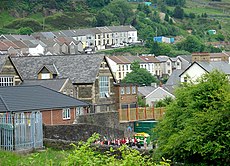Clydach Vale
Clydach Vale
|
|
|---|---|
 A view of Clydach Vale—school in foreground |
|
| Clydach Vale shown within Rhondda Cynon Taf | |
| Population | 2,799 {2011} |
| OS grid reference | SS982930 |
| Principal area | |
| Ceremonial county | |
| Country | Wales |
| Sovereign state | United Kingdom |
| Post town | TONYPANDY |
| Postcode district | CF40 |
| Dialling code | 01443 |
| Police | South Wales |
| Fire | South Wales |
| Ambulance | Welsh |
| EU Parliament | Wales |
| UK Parliament | |
| Welsh Assembly | |
Clydach Vale (Welsh: Cwmclydach and adjoining Blaenclydach) is a village adjoining Tonypandy in the county borough of Rhondda Cynon Taf, within the Rhondda Valley, Wales. It is named for its situation on the Nant Clydach, a tributary of the River Rhondda.
Before the coming of industrialisation, Clydach Vale was a sparsely populated agricultural area. Records show that in the seventeenth century the area was named Dyffryn Clydach (Clydach Vale), and was divided into two areas, Cwmclydach and Blaenclydach. Those two localities are today very much integrated. The Cwmclydach Community Partnership is made up of groups from both villages (and the wider community), plus the Clydach Vale Countryside Park and Mountain Forestry.
Clydach Vale Countryside Park lies between Cwmclydach's two lakes and is a haven for birds, flowers and butterflies. Two main routes are available for walkers and cyclists, with several access routes on to the surrounding mountains.
In the 1840s coal mining began in the valley, but this was on a small scale and no pits were sunk at this time. Towards the end of the century there was a marked increase in mining activity, several collieries being opened, including Lefel-Y-Bush (1863), Blaenclydach (1863), Cwmclydach (1864) and Clydach Vale Colleries Nos. 1, 2 and 3.
The Clydach Vale colleries would later become synonymous with worker activism within the South Wales coalfield. Opened in 1872, the Clydach Vale colliery No. 1 was originally sunk by Osbourne Riches and Samuel Thomas and, by 1894, was served by the Taff Vale Railway. Following the death of Thomas in 1879, his sons became managing partners and, in 1895, formed Cambrian Colleries Ltd. The Cambrian Collieries were a focus for disputation between active trade unions such as the South Wales Miners' Federation and the Cambrian Combine, a business network of mining companies, formed to regulate prices and wages in south Wales. A bitter clash between them resulted in the 1910 Tonypandy Riot.
...
Wikipedia

